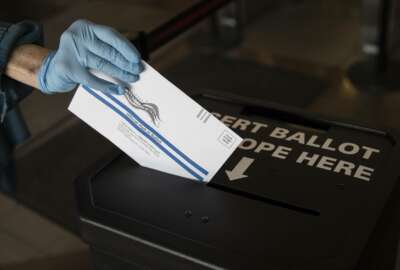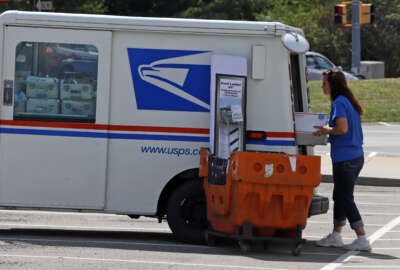White House looks to give USPS $5B to support election mail over next decade
The administration, as part of its fiscal 2023 budget request, expects the money would fund an expansion of USPS delivery capacity in underserved areas and supp...
The Biden administration is looking to give the Postal Service $5 billion to support its mail-in voting operations over the next decade.
The administration, as part of its fiscal 2023 budget request, expects the money would fund an expansion of USPS delivery capacity in underserved areas and support for vote-by-mail, including making ballots postage-free and reducing the cost of other election-related mail for jurisdictions and voters.
The White House seeks funding for USPS election mail operations in addition to $10 billion over the next decade to provide state and local election officials with “a predictable funding stream for critical capital investments and increased staffing and services.”
“This proposal expands on the essential public services that the Postal Service provides to the American people and will also help to relieve budget strain on local election offices across the country,” the administration wrote.
The administration’s $5 billion request would expand the affordability and reliability of election-related mail service at USPS through 2032.
“The budget proposes legislation to strengthen services offered by the United States Postal Service to support secure, free and fair elections. This includes making official ballot materials free to mail and reducing the cost of other election-related mail for jurisdictions and voters, and enhancing the Postal Service’s ability to securely and expeditiously deliver and receive mail in underserved areas,” the budget proposal states.
USPS spokesman David Partenheimer said USPS “is committed to fulfilling our role in the electoral process and supporting election officials that choose to utilize us as a part of their election system.”
“The U.S. Postal Service is committed to the secure and timely delivery of the nation’s election mail as acknowledged in President Biden’s 2023 budget. It is the task of policymakers — both elected leaders and election officials — to decide the role that the U.S. Mail should play in our electoral system, and what funding or other support it should receive. Our task, as the Postal Service, is to ensure that we provide secure and timely delivery of the ballots that are entrusted to us for mailing, as well as to ensure that both elections officials and individual voters who choose to utilize the mail understand how to do so effectively We look forward to learning what other details Congress might put forward in legislation in response to this budget proposal,” Partenheimer said in a statement Tuesday.
The administration’s budget request would help USPS maintain the “extraordinary measures” it used in fall 2020 to deliver mail-in ballots to voters and election boards on time.
USPS, in a lawsuit it settled last December, agreed to keep these extraordinary measures in place for federal elections through at least 2028. This includes the agency publicly posting national guidance documents related to election mail on its website ahead of the 2022, 2024, 2026 and 2028 elections.
The FY 2023 budget request, consistent with recent annual appropriations, would also give USPS $50 million for overseas voting and mail for the blind.
The administration’s budget, if implemented by Congress, would be a considerable amount of money for USPS to receive through appropriations. The agency is largely self-funded on its own revenue, and usually doesn’t receive congressional funding for its day-to-day operations.
Congress, however, granted USPS $10 billion in COVID-19 relief spending.
The House also passed the Build Back Better Act which would have given USPS $6 billion to purchase more electric vehicles as part of its next-generation fleet, as well as acquire the necessary infrastructure to charge them. The spending package, however, failed to pass the Senate.
White House outlines electric vehicle spending — but not direct funds for USPS
The White House’s budget plan doesn’t propose direct appropriations for USPS electric vehicles, but would allow the General Services Administration to use the funding it would receive under this plan to procure electric vehicle charging infrastructure for USPS.
The budget request specifically would allow the General Services Administration to spend some of its $300 million on charging infrastructure for USPS infrastructure.
The FY 2023 budget broadly calls for $757 million for zero-emission fleet vehicles and supporting charging or fueling infrastructure in the individual budgets of 19 federal agencies to provide “an immediate, clear, and stable course of demand to help accelerate American industrial capacity to produce clean vehicles and components.”
Of that spending, GSA would set aside $300 million for GSA to build charging infrastructure, purchase electric vehicles and consolidate existing conventionally-fueled vehicles into the GSA fleet.
The administration proposes giving GSA the discretion to transfer or merge this funding with appropriations at other federal agencies, “including for the procurement of charging infrastructure for the U.S. Postal Service.”
USPS announced last week it spent nearly $3 billion on 50,000 next-generation vehicles as part of its initial order to the vendor Oshkosh Defense. More than 10,000 vehicles as part of that initial order are electric vehicles.
The administration’s budget plan, more broadly, also outlines agency climate resiliency efforts.
The White House calls for $18 billion for climate resilience and adaptation programs across the federal government, including $3.5 billion for the Department of Homeland Security, $5.9 billion for the Interior Department, $1 billion for the Housing and Urban Development Department and $376 million for National Oceanic and Atmospheric Administration.
The Energy Department would also launch a new Net-Zero Laboratory Initiative with a $58 million competition to reduce emissions across all national laboratories.
The administration also proposed increasing the size of the federal firefighting workforce by providing $1.8 billion for personnel and preparedness, and ensuring that no federal firefighter makes less than $15 an hour.
The budget would also permanently sustain a pilot program that leverages sensitive satellite imagery to rapidly detect wildfires.
White House applauds passing postal reform legislation
The budget document also applauds Congress for recently passing the Postal Service Reform Act, the first major piece of USPS reform legislation in 15 years.
The administration said the legislation will “improve the Postal Service’s long-run financial outlook, without sacrificing quality, affordable health coverage for Postal employees and retirees.”
“The administration looks forward to working with the Congress to ensure that the goals of this legislation are met in an efficient and equitable manner and to advance additional reforms and financial support to maintain and expand the public services that the Postal Service provides to the American people,” the administration wrote.
The legislation primarily eliminates a 2006 mandate from Congress to pre-fund retiree health benefits and requires all future USPS retirees to enroll in Medicare parts B and D.
The administration, in its FY 2023 budget request, expects USPS will pay more than $27 billion in compensation for its full-time permanent workforce in FY 2023, up from more than $24 billion in fiscal 2021.
USPS is also expected to pay $10 billion in civilian personnel benefits in FY 2023, consistent with recent years, according to the budget document. USPS, per the budget request, also expects to spend $4.5 billion on benefits for former personnel next fiscal year.
The administration’s budget request also directs USPS to ensure six-day delivery and rural deliver at not less than the 1983 level.
The administration also specifies in its budget request that none of these funds shall be used to consolidate or close “small rural and other post offices.”
The FY 2023 budget request also proposes a $271 million budget for the USPS inspector general’s office, and a more than $20 million budget for the Postal Regulatory Commission.
Copyright © 2024 Federal News Network. All rights reserved. This website is not intended for users located within the European Economic Area.
Jory Heckman is a reporter at Federal News Network covering U.S. Postal Service, IRS, big data and technology issues.
Follow @jheckmanWFED






